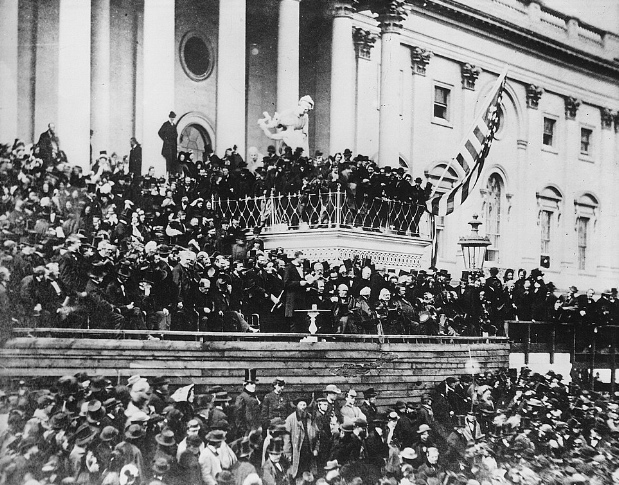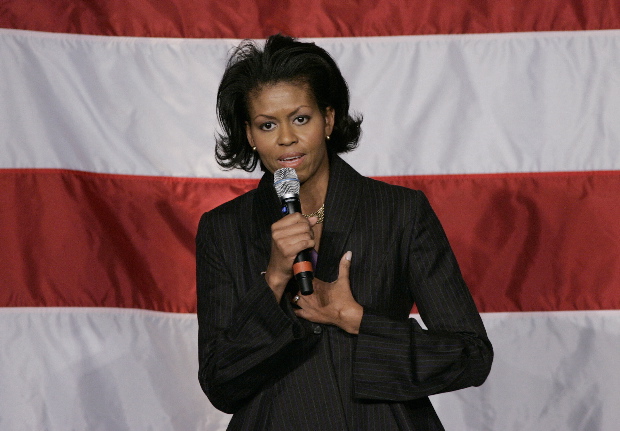
I
personally like to hear a little religion come up in the political
discourse of this country. Abraham Lincoln, like Martin Luther
King after him, was very good at reminding us that our actions of the
moment have to be seen in the light of transcendent values, and
religion has powerful language in which to frame such ideas.
Here's Lincoln on the human cost of the Civil War (spoken at his Second Inaugural, above):
Fondly do we hope — fervently
do we pray — that this mighty scourge of war may speedily pass away.
Yet, if God wills that it continue until all the wealth piled by
the bondsman's two hundred and fifty years of unrequited toil
shall be sunk, and until every drop of blood drawn by the lash
shall be paid by another drawn with the sword, as was said
three thousand years ago, so still it must be said, “The
judgments of the Lord are true and righteous altogether.”
Word up, dude.

Barack Obama first got my attention in his speech at the 2004
Democratic Convention when he said, in the space of a few lines, “We've
got some good gay friends in the red states . . . and we worship a
righteous God in the blue states!” It occurred to me that no
other politician on the national scene could say both things with such
fervor and conviction. I'm sure that Hillary Clinton's faith and
John McCain's faith are sincere, but neither could use the phrase “a
righteous God” with such an unselfconscious sense of joy — and neither would dare to
speak with true affection for gays, afraid of alienating some
constituency or other, regardless of their stated positions on gay
rights.
I was really pissed off at the Mike Huckabee campaign ad in which a
bookcase behind him was lit to present the image of a gleaming
cross. Huckabee later said it was inadvertent. Right.
It was a Christmas message, in which Huckabee mentioned celebrating the
birth of Christ — why lie about the cross image? Was he just too
wimpy to put a crucifix behind him — did he think it would be better
to sneak it in? Subliminal messages like this, especially when
denied, are very
creepy. (Have a look at the ad yourself here and draw your own conclusions.) I also am totally unmoved by mere statements of faith, or
policies defended by scriptural doctrine. I want the ideas behind
those doctrines to take center stage in the discourse.

Michelle Obama, who is becoming a truly powerful speaker, said the other day
in California that “our souls are broken” in this country because we have lost some of
our capacity for empathy with “the least of
these”. She was using what is essentially a religious argument,
and referencing scripture in the process — these lines from Matthew:
Inasmuch as ye have done it unto one of the least of these my brethren, ye have done it unto me.
That's
one of the most radical statements in the history of human thought, and
a keystone of Christian faith, but Mrs. Obama was using it in the
context of an argument about ideas — about the way a democracy ought
to function. She wasn't arguing about getting religion back into
public life, with symbols and slogans, she was getting religion back into public life by speaking to (and from) its wisdom.
You don't have to be religious to appreciate the value of religious
language for illuminating complex moral ideas — Lincoln's own
religious faith was a little murky even as he penned the words I've
quoted above. And even if you are religious, you can afford to be
offended when politicians use the language of faith as a marketing tool.

We in Australia are taking a very strong interest in the 2008 Presidential race, and your post offers a very original perspective on the campaign. Thanks. I fully support your worthy conclusion that “you don't have to be religious to appreciate the value of religious language for illuminating complex moral ideas”.
My early personal support for Obama has waned of late. Despite his charisma and his eloquence there seems to be an absence of solid ideas that would make him a compelling choice.
In America, just as you can't avoid faith in politics, race is also always an element. And there are issues for Obama in both these areas as raised here:
Christopher Hitchens says Obama has adopted a dumbed-down faith in a Slate article, Identity Crisis – There's something pathetic and embarrassing about our obsession with Barack Obama's race, at http://www.slate.com/id/2181460/
Shelby Steele in his new book, A Bound Man: Why We Are Excited About Obama and Why He Can't Win, says Obama has compromised his candidature by his “bargaining” person which allows the racial divide and racial history to be set aside: http://fora.tv/2008/01/18/Barack_Obama_and_the_Politics_of_Race
Thanks as always for your comments. I checked out the links you provided and found the arguments presented there less than compelling — a bit naive and superficial.
Hitchens, a brilliant gadfly, is also a passionate anti-religious idealogue — infuriated more, I suspect, about Obama's sincere religious rhetoric than about the racial contradictions of his appeal. Steele is a committed Republican looking for a racial argument against Obama to underpin his ideological antipathy to him as a liberal.
Steele, for example, speaking just a few weeks ago, predicted that Obama would not be able, because of his personal contradictions about race, to attract large numbers of black voters — but he has. That in itself suggests a degree of wish-fullfillment in Steele's argument — a sense that he's not looking at Obama dispassionately.
Obama's role as a “bargainer” has roots in black American identity but is in fact a phenomenon in all American politics and culture — part of the way we negotiate the deep divisions of our nation. So Abraham Lincoln, one of the few intellectual giants ever to hold the Presidency, wore the mask of a backwoods sage, promising not to hold his intelligence and erudition against the common man. JFK ran as Catholic who wasn't really a Catholic, who was no different from those in the Protestant mainstream — a bargainer not a challenger on the issue of religious prejudice.
They were all shape-shifters in service to higher causes. You can see it as political flim-flam, or you can see it as the imperfect way we Americans edge sidewise e pluribus into unum.
Thanks for your perspective, which made me re-think my responses to these two pundits. I look forward to more campaign commentary from you.